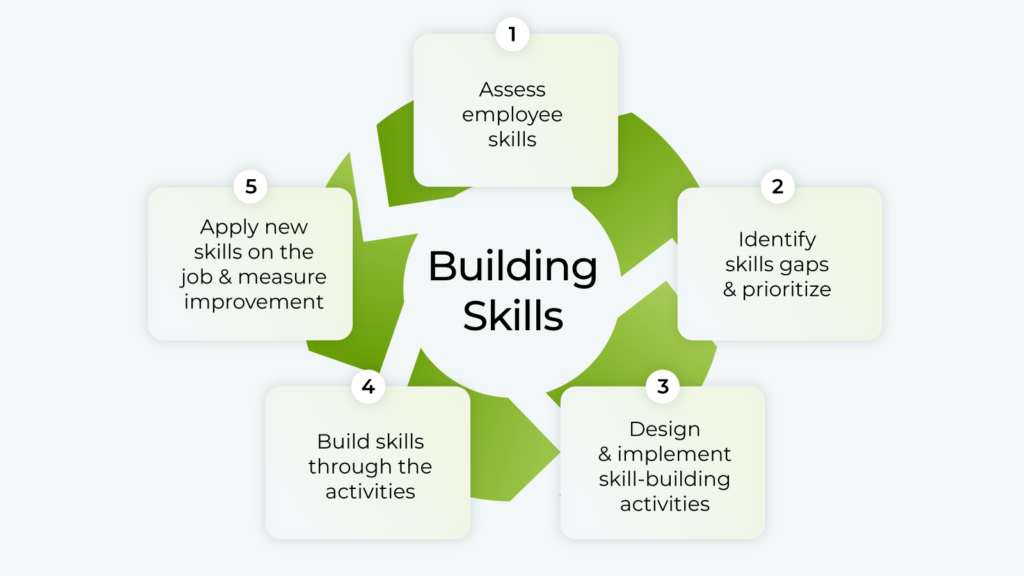Understand the technical skill management

“Give me six hours to chop down a tree, and I will spend the first four sharpening the axe.” – Abraham Lincoln
- Introduction
- What is technical skill management?
- Types of technical skills
- The need for managing technical skills
- Steps to effective technical skill management
- Benefits of technical skill management
- Challenges in technical skill management
- Future of technical skill management
- Real-life applications
- Conclusion
- FAQs
Introduction
Many have come across the adage, “It’s not about working hard, but working smart.” This philosophy is not just a catchphrase but holds profound implications, especially when applied to the management of technical skills. But what exactly does this entail? At its core, working smart emphasizes the importance of efficiency, adaptability, and strategic thinking over mere effort.
It’s about leveraging one’s strengths, utilizing the right tools, and making informed decisions to achieve optimal results. For individuals, this approach can lead to enhanced productivity, personal growth, and a competitive edge in their respective fields.
Organizations, on the other hand, can benefit from streamlined processes, innovative solutions, and a workforce that is agile and equipped to handle the challenges of the modern technological era.
In essence, understanding and applying the principle of working smart can be the difference between merely keeping pace and truly excelling in today’s dynamic tech-driven world.

For individuals, this approach can lead to enhanced productivity, personal growth, and a competitive edge in their respective fields.
What is technical skill management?
Definition
Technical skill management fundamentally revolves around a structured methodology to pinpoint, cultivate, and harness the technical abilities inherent within an individual or an organization.
It can be likened to a well-organized tool kit. Just as one wouldn’t resort to using a hammer for the delicate task of screwing in a lightbulb, similarly, distinct tasks necessitate precise technical proficiencies.
Ensuring a robust management of these skills is akin to ensuring that the most appropriate tool is selected for any given task. This not only streamlines processes but also optimizes results, guaranteeing that tasks are executed with the utmost efficiency and accuracy.
In essence, technical skill management is important in aligning employees’ skills with specific business challenges, ensuring that both individuals and organizations are primed for success.
Importance
Merely possessing technical skills is no longer sufficient. Instead, the true differentiator lies in one’s ability to adeptly manage, refine, and enhance those skills over time.
Companies that master this art of continuous skill evolution stand out in the competitive landscape. Their prowess in nurturing and updating technical competencies not only propels them ahead but also fuels heightened efficiency and sparks innovation.
Such organizations are not just keeping pace with the technological curve but are actively shaping it, positioning themselves at the forefront of their industries.
By emphasizing the dynamic project management and enrichment of key technical skills, they pave the way for sustained growth and cutting-edge advancements.
Types of technical skills
Hard skills
Quantifiable abilities, like coding, data analysis, or machine operation, represent the conventional definition of “technical” skills.
These are tangible proficiencies that one can acquire and measure. However, the mere possession of these skills isn’t the end of the journey.
The true distinction comes not just from having them, but in the manner in which you oversee, refine, and continually update them.

It’s this proactive approach to skill management and enhancement that truly sets individuals and organizations apart, marking the difference between being competent and being exceptional in today’s competitive landscape.
Soft skills
Though they might not fit the conventional definition of “technical,” soft skills such as communication, teamwork, and problem-solving hold paramount importance in the realm of technology.
These interpersonal competencies bridge the gap between raw technical prowess and real-world application. Consider a gifted coder, for instance; their coding expertise might be unparalleled, but without the ability to effectively convey their ideas, collaborate with others, or troubleshoot challenges, their brilliance might remain untapped or misunderstood.
In essence, while technical skills lay the foundation, it’s the soft skills that truly elevate and bring those capabilities to life in a cohesive, impactful manner in today’s interconnected world.
Though they might not fit the conventional definition of “technical,” soft skills such as communication, teamwork, and problem-solving hold paramount importance in the realm of technology.
The need for managing technical skills
The technical proficiencies that are in demand today might very well become outdated in the blink of an eye.
This transient nature of skills underscores the paramount importance of effective management and continuous learning. By doing so, individuals and organizations can ensure they stay pertinent, flexible, and always a step ahead in this competitive milieu.
A case in point is Blockbuster. Despite its once-dominant position in the entertainment sector, its inability to adapt and evolve with the times led to its eventual decline.
This serves as a poignant reminder that adaptability and foresight, rather than mere technical prowess, are the true hallmarks of lasting success in the modern world.
Steps to effective technical skill management
Assessment
The first step in navigating the vast landscape of technical competencies is to take stock of the existing skills within an individual or an organization.
It’s akin to opening up your toolkit and meticulously examining each tool you possess. What capabilities do you currently hold?
Which software or processes are you adept at? By laying out and understanding the breadth and depth of these skills, you set the foundation for future growth.
After all, knowing what’s in your toolkit is essential before determining what might need sharpening, replacement, or addition to ensure you’re well-equipped for the challenges and opportunities that lie ahead.
Development
After taking a comprehensive inventory of the existing technical skills, the next pivotal step is to discern what might be missing or needs further enhancement. This process entails aligning your current capabilities with future goals and industry trends.
Do you have gaps in knowledge that need bridging? Or perhaps there are emerging technologies that you need to familiarize yourself with? Addressing these needs might mean delving into specialized training programs, enrolling in relevant courses, or even bringing on board new talent with the desired expertise.
By proactively identifying and filling these gaps, individuals and organizations position themselves to not only meet the demands of the present but also to thrive in the future.
Implementation
Having identified and honed your technical skills, it’s imperative to deploy them strategically. By allocating resources, be it human talent or technological tools, to areas where they can make the most impact, you unlock unparalleled levels of efficiency and productivity.
It’s akin to placing the right pieces in a complex puzzle; when each skill is optimally utilized in its rightful place, the entire operation runs more smoothly and effectively.
Witnessing this transformation, where skills are not just acquired but are also expertly applied, is truly where the magic happens, propelling both individuals and organizations to new heights of excellence and achievement.
Review
It’s essential to periodically assess the potency and relevance of the skills being employed. In a dynamic world where industries and technologies are in constant flux, what might be highly effective today could become less impactful tomorrow.
Regular evaluations allow for a pulse check on the current skill set’s applicability and efficacy. Are these skills still in line with industry demands? Are there newer methodologies or tools that could enhance performance?
By consistently posing these questions and seeking answers, individuals and organizations can ensure that they’re not just maintaining the status quo but are continually refining and upgrading their arsenal to stay at the forefront of their respective domains.
In essence, continuous evaluation and adaptation are the keys to sustained growth and success.
Benefits of technical skill management
The advantages of honing and effectively managing skills are manifold. From elevating productivity levels to catalyzing groundbreaking innovations, the rewards are both tangible and transformative.
To draw an analogy, it’s akin to trading in an antiquated bicycle for a state-of-the-art motorbike. Not only do you experience a significant boost in speed and efficiency, but there’s also an undeniable allure in riding something so modern and sleek.
Just as the motorbike represents a leap in transportation capabilities, optimizing skills and processes in any field signifies a quantum leap in performance, setting the stage for unparalleled achievements and progress.
Riding into the future has never looked, or felt, so exhilarating!

The advantages of honing and effectively managing skills are manifold.
Challenges in technical skill management
While the journey to skill optimization and effective management promises numerous rewards, it’s not devoid of obstacles.
The path is often strewn with challenges such as resistance to change, where individuals or entire teams might be hesitant to embrace new methodologies or tools.
Additionally, constraints like limited resources or reliance on archaic systems can act as roadblocks, hindering smooth transitions and upgrades. However, as the adage goes, every challenge presents an opportunity in disguise.
These hurdles, when approached with resilience and strategic thinking, can pave the way for innovative solutions, fostering growth and adaptability.
In the face of adversity, the true test lies not in avoiding challenges but in harnessing them as catalysts for change and progress. After all, it’s the trials that shape and refine the journey, leading to even more fulfilling destinations.
Future of technical skill management
In an era where AI and automation are rapidly reshaping industries, the future envisions a harmonious fusion of human ingenuity and machine precision.
Gone are the days when merely having a skill set would set one apart. As we move forward, the emphasis will increasingly pivot from just possessing technical abilities to the agility to adapt, refine, and manage those skills in tandem with emerging technologies.
This evolution demands a mindset that is not only receptive to change but also proactive in seeking out opportunities for growth and collaboration with AI-driven tools. It’s a call to action for individuals and organizations alike to not just be spectators but active participants in this technological revolution.
So, as we stand at the cusp of this exciting juncture, one must ask: Are you poised and prepared to embrace the future?
Real-life applications
Leading companies, renowned for their prowess in the tech realm, have masterfully harnessed the art of technical skill management.
By fostering a culture of continuous learning, innovation, and adaptability, they’ve positioned themselves at the vanguard of their industries.
Their commitment to nurturing and optimizing technical competencies is evident in the groundbreaking products and services they introduce regularly.
It’s this proactive approach to skill management, combined with a relentless drive for innovation, that cements their status as industry trailblazers.

Their achievements serve as a testament to the power of skill adaptability and forward-thinking in shaping the technological landscape.
It’s hardly surprising, then, that they are celebrated as the gold standard in their respective domains.
Conclusion
Technical skill management transcends being merely a trendy term; it embodies the very essence of strategic navigation in our technology-driven era.
This approach serves as a beacon, illuminating the path for both individuals and organizations, directing them toward unparalleled success in an increasingly digital world. It’s a holistic perspective that emphasizes not just the acquisition of skills but their effective cultivation, application, and evolution.
So, as you embark on the journey of learning a new competency, bear in mind that the true value lies not just in its possession, but in the adeptness with which you nurture and wield it in the ever-evolving technological landscape.
After all, in this age, it’s about mastering the art of skill management as much as the skill itself!
Discover how DevSkiller skills management tool can help you.
Schedule a demo with one of our product experts or watch this quick 5-min demo video to find out more.
FAQs
1. What’s the difference between hard and soft skills?
Hard skills are tangible and quantifiable, list technical skills like coding. Soft skills, on the other hand, deal with interpersonal interactions, like communication.
2. Why is technical skill management vital for organizations?
It ensures they remain competitive, innovative, and efficient in an ever-evolving technological landscape.
3. Can individuals benefit from technical and project management skills?
Absolutely! It helps in personal development, career advancement, and staying relevant in the job market.
4. How often should technical skills be reviewed?
Regularly! With the pace of technological advancement, it’s essential to stay updated and adaptive.
5. Is your technical skills involve skill management costly?
Initially, there might be costs involved in training and development. But in the long run, the ROI in terms of efficiency and innovation is well worth it.
Share post